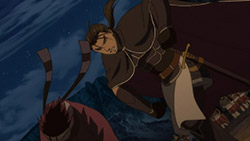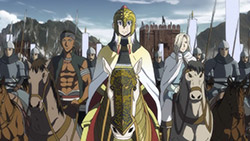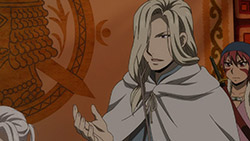 |
 |
 |
 |
 |
 |
 |
 |
 |
 |
 |
 |
 |
 |
 |
 |
 |
 |
 |
 |
 |
 |
 |
 |
 |
 |
 |
 |
 |
 |
 |
 |
 |
 |
 |
 |
「別れの詩」 (Wakare no Uta)
“A Song of Farewell”
The realities of politics clash with the kindness of Arslan. On the balance, the kindness of Arslan wins.
The Banishment of Gieve
I don’t think we were supposed to feel good about the way Gieve was banished, as staged as it was. Arslan certainly didn’t feel good about it. And on that score, it was done well. Even with Narsus’ mention of “one more gambit” earlier in the episode, when it was all going down, there was a tremor of uncertainty. The acting was too good, with even Kishward making the farce appear real. Which is good; no viewer in their right mind would think Arslan would actually banish Gieve, not without a much greater transgression. But making us doubt it for a second is good.
But the underlying betrayal of Gieve, the sacrifice of all he has done for Arslan in the face of political expediency … even if it was necessary, it didn’t feel good. The idealist in us all wants to rebel, to pillory Arslan and Narsus for using their comrade so, even with his consent. And yet, was it not the right choice? The internal unrest existed, and such a situation could have left many more soldiers dead than would be were it not there. Hell, it almost did.
The Idiots Three
The three bakas have fulfilled their roles. They’re proxies for the way Arslan must win over his army—and eventually, the people of Pars—to his way of thinking, rather than the imperial terror that was Andragoras (and will/would be Hermes). What I appreciated was that they weren’t all the same, weren’t entirely shallow. Zaravant and Esfan were largely the same—proud, quick to anger, more bluster than intelligence—but Tus was more prudent, counseling caution and trying to calm tempers. Just that little bit of difference made them separate characters, and a little bit more interesting for it.
The Philosophy of Arslan: Do Not Needlessly Waste A Human Life
I liked that Arslan went after the idiots three, even if it would have been more expedient to sacrifice them for a more rapid march. And perhaps that would have been the “right” decision; it could be that they’ll lose more men than they saved if this gives Lusitania more of a chance to consolidate or defend. But I like the feeling behind Arslan’s decision, and even the tactical implications of it as well.
For all I enjoy reading, watching, and even writing stories of battle and war, I have a dim view of it in reality. A human takes three-quarters of a year to bear and birth, and many more to raise—fourteen so far for Arslan, and probably closer to twenty each for all of his soldiers. I would never want to waste all that time, love, and effort by spending a human life frivolously. Even if war must be joined—and in this story, from Arslan’s point of view, it certainly does—then that most precious of resources should only be spent when it absolutely must. So there’s a moral component to not abandoning those men, for me, and to Arslan as well. But what of the tactics?
True loyalty is far more precious than silver or gold. Imagine serving first under Andragoras. A frightening man, but a competent warrior, at least up until he lost it all. He is a king you would serve as much out of fear as loyalty. Then imagine yourself serving under Arslan. Imagine if you’re Zaravant, Esfan, or Tus. Where Andragoras would have left those men to die—or, if they somehow survived, either banished or killed them himself—Arslan forgave them. They expected to die, but they were saved by his earnest magnanimity instead. Would you not fight all the harder for someone like that?
And before someone trots out Machiavelli at me (though I’m sure someone will still say that everything I’m about to say is wrong), let me address that: On whether it is better to be loved or feared, Machiavelli concluded that it was better to be feared, because that is under the prince’s control, whereas love is given according to each man’s will. (Though the prince must always endeavor to avoid hatred.) That’s not wrong, though it’s often misunderstood. Between love and fear, perhaps fear is preferable—but why must we choose? Arslan’s Pars will need a certain amount of fear—of laws, and the consequences of breaking them—but when it comes to the people closest to him, love is much better, for their wholehearted loyalty is a force multiplier for the performance of those they command. And whether we’re loved or not—or rather, whether we’re someone who is deserving of love—is far more under our control than many of us think.
Gieve & Farangis – To Ship, or Not To Ship
I’ve resisted for a long time truly shipping Gieve and Farangis. For all Gieve’s flirting, and for all their wonderful banter, they never truly seemed like a match. Until somewhere along the line, Gieve stopped flirting all the time, and started just … being himself. Being there for everyone—for Farangis, for Arslan, and for all the rest of their merry band. Somewhere along the line, when I wasn’t paying attention, it feels like Gieve stopped treating Farangis like a prize to be won, and started treating her like Farangis.
Farangis is the first to hear Gieve’s music. She refers to him, with a smile, as a “capricious Djinn.” She finds Gieve up on the rocks, and gives him Arslan’s message. And she stares after him when he leaves. I wonder, has Farangis grown fond of Gieve’s company? It could be. It would make me smile if she had, and if Gieve’s absence makes her heart grow fonder. I won’t be shipping them, though. I’ll keep that for the kawaii anime girls. Gieve and Farangis feel too much like adults to me. I’ll let them figure it out on their own, and either way is all right.
Looking Ahead – Where For Hath Thou Gone, Gieve?
My most immediate question: When is Gieve coming back? Er, no—focus, Stilts. My most immediate question: Who did Narsus send Gieve after? My gut is that it’s a new character, otherwise the foreshadowing seems a bit much. I say that because my first thought was that it was Kubard, but had it been, Narsus would have just said his name. Besides, Kubard would provide a slight tactical improvement, not much more.
Though on the subject of Kubard, I’m glad he’s choosing Team Arslan. For some reason, I feel like for someone such as Kubard to choose Arslan over Hermes—for someone who is in no way an upright, moral individual to choose the young prince over the silver mask—is one helluva vote of confidence. One more badass for Arslan’s Brigade, coming right up!
tl;dr: @StiltsOutLoud – Gieve gives one last performance. His role: The villain who is exiled by Arslan. Though that doesn’t stop him from saving the day #arslan 21
Random thoughts:
- Case in point: It feels like it’s been a long time since Gieve sparkled. And this time, it seemed more like one last inside joke before he departed.
My first novel, Wage Slave Rebellion, is available now. (More info—now available in paperback!) Sign up for my email list for a FREE sequel short story. Over at stephenwgee.com, the last four posts: Rejection, the secret place, & fundamentals, What are your two skills?, Passing the Bechdel Test, and Absence (from work) makes the heart grow fonder.
Preview
 |
 |
 |
End Card
 |

Today’s endcard is by Nakamura Hikaru, mangaka of Arakawa Under the Bridge (wealthy guy lives under a bridge with girl and other weird vagrants) and Saint Young Men (Jesus & Buddha live together as roommates in Tokyo).
The endcard itself is a direct parody of Saint Young Men. Note how the apartment setting and white T-shirts match the SYM setting.
http://asianwiki.com/images/e/ed/Saint_Young_Men-0001.jpg
https://randomc.net/image/Arslan%20Senki/Arslan%20Senki%20-%2021%20-%20Large%2007.jpg
https://randomc.net/image/Arslan%20Senki/Arslan%20Senki%20-%2021%20-%20Large%2025.jpg
https://randomc.net/image/Arslan%20Senki/Arslan%20Senki%20-%2021%20-%20Large%2033.jpg
Farangis.
Machiavelli lot more sophisticated than that. Yes if you had to chose fear is better but Machiavelli is a major proponent of being loved in several places so he prefers both when possible. In example Machiavelli discussed how the Turks made the conquered people of what is Turkey now loyal content citizens. The leader of the Turks did this by no pillaging then making the people of the new area full citizens treating them the same as all his citizens then the leader of the Turks moved the capital from Damascus to the renamed Istanbul. Machiavelli is very grey just not a fan of half measures he was rather make conquered areas fully equal parts of your empire or go Roman on Carthage style and kill them all and salt the fields and poison the wells so no one can ever live there. Treat em nice or treat em all dead.
Arslan is basically giving the Paton movie speech, don’t die for your country make then die for theirs. Yes a general even Patton will sacrifice men in great numbers to win but only when necessary. Most great General realize letting the enemy kill off units of yours achieving a victory is good for the enemy’s moral and bad for your sides moral. So yes you rescue your troops when ever possible losing a gain if not critical is worth it and the right thing to do. If it rescue them or lose to the enemy you lose em and the intelligent survivors if any will understand it was needed.
Glad Farangis is back in her home liberating uniform. Remember anyone who wants to oppress women makes them cover up.
It was tough before the modern professional army system you got what ever commander the feudal system gave the troops they came with. So trying to diplomatically handle people who if you removed them you often lost their troops was hard.
Aye, Machiavelli has a more nuanced opinion on many of these matters. I probably should have mentioned that he favors being loved in some situations, but I honestly forgot. Been too long since I’ve read his work. Probably oughta do so again.
Him not being in favor of half measures is a good way to put it. And not just because of the Breaking Bad reference, nyahaha!
I’d serve under Narsus, who’s a winner. Arslan is immature, clearly not ready, and not deserving– and was volatile enough to be lose faith at the drop of a hat. The real leaders of history were a lot more cunning, much more like Gieve actually. If they were propped up as puppets, they’d quickly shed those trying to use them and overturn power for their own sake.
Redrocket’s right. It isn’t just a black and white love or feared, it is both– and Andragoras was that sort of person too (loved by his allies, hated by his enemies, feared by all that fail him).
Fiction likes the obvious ‘good guys’, but history shows much more practical players doing the winning– and ones willing to be absolutely brutal. Misbehavior often means execution. As was the practice of Decimatus with the Romans, slaughter of populaces with the Mongols, Alexander the Great’s execution of satraps & governers.
Great leaders aren’t wilting flowers. They have teeth.
Perhaps you would but most people would not, especially people from that era(but prolly even today). Narsus, for all his Stu-level tactical prowess, lack’s what both Arslan & Andragoras have. He isn’t exactly a man of the people. He doesn’t give off an aura of respect and fear that Andragoras had, nor has the caring ruler vibe of Arslan. N
Narsus doesn’t enjoy being in the spotlight. For him it’s enough that the troops just do as they’re told and leave all the planning to him. He’s the masterful puppeteer that has everyone dancing on his strings but people aren’t puppets.
Gieve x Farangis is totally an adult relationship. Spot on. I didn’t notice the lack of flirting. I think it just went more subtle. Gieve always flirts. His very presence is flirting, as he’s too animated and too charismatic not to. His communication with her definitely became deeper than shallow compliments though.
His very presence, staying atop the mountain waiting for Farangis is flirting. He could’ve left without a word, but let himself be found.
Think of me Farangis
I will, and your song is terrible.
Farangis gives as well as she takes. That’s a relationship of equals, but the relationship is there. Let it bloom over time on its own.
I am totally shipping them though– just as adults rather than childhood fantasy… Adult fantasy? Sounds wrong but appropriate given how these two act and dress.
Aptly put. Agreed.
A excerpt of the review from “The True Parsian Spirit”:
“For all his speeches about justice and friendship, the moment his companions of commoner origins become a liability, a word from the evil mastermind Narsus is enough for fake prince Arslan to publicly humiliate and banish them to appease the arrogant sons of the corrupt, racist and slave-owning nobility.
And did the appeasement work? NO! The aforementioned nobles prove to be as disloyal and unruly as ever, putting themselves, their men and the whole army at stake after falling in a trap set by the brave Lusitanians soldiers.
And who saved them? Narsus, whose military prowress is just exaggerated propaganda and who laughed at the Lusitanian Chief Librarian’s war skills despite the fact he plans to become Court Painter by sheer nepotism? NO! It was the banished subject who saved them.
And what happened then? Did Arslan punish the disloyal nobles and recognized and rewarded his commoner companion in front of everyone? NO! He welcomed the arrogant fools and left the true Parsian hero to rot to do Narsus’ dirty business.
Is this the man we want as king? An elitist hypocrite that follows blindly whatever his chancellor tells him to do? NO! We can only pray to Yaldabaoth for the day the terrorist leader Narsus and his puppet king Arslan the Bastard are apprehended and face justice alongside the bloody tyrant Andragoras the Usurper”.
End of the quote.
In a more serious tone, yeah, I felt bad at Gieve’s fake banishment. But do you know what hurt me most? The “official” reason.
No matter how I see it, the noble was at fault. Couldn’t they think of a better excuse to banish Gieve? You know, like stealing (he is a thief, after all), not precisely hurting a fool’s ego by boasting about the truth. No, not just a simple truth: a humanitarian deed that made him the hero of Ecbatana and got him rewarded by the queen herself. If the noble couldn’t stomach that (since it hits him close home, I don’t expect him to thank Gieve, even if he should), it was him who should have been banished… as later events confirmed.
new of banishment gave good cover to Gieve into Lusitania area as needing.with him know man for love woman and money he can be Double agent and can be believe.
He can, but am I the only one who remembers that he doesn’t owe anything to them? He wasn’t saved by them, he wasn’t promised an official position, he isn’t a vassal or anything else. He was just a rogue that wanted to get money and live a good life.
Gieve has changed a lot. This episode makes him a far more heroic figure than the rest of Arslan’s troupe.
Personally, I’m just happy that it was due to Gieve that those soldiers were saved and for once, Narsus didn’t have a hand in it. His plan didn’t include saving them after all.
Actually Narsus had “saving them” as part of his plan, he did give Arslan both options, to either stop and rescue the stranded companies or to march on and use them as sacrifices, he kinda knew Arslan will choose the first choice (that’s why every one had the smiling montage when he made the choice, like they all went “I knew it”), that’s why he sent Elam and Alfreed ahead to look for the stranded soldiers … he had planned ahead but he still failed due to the terrible terrain, that’s one of the few times where his plan actually doesn’t work.
I’ll admit, I didn’t like that Arslan went along with Narsus’ gambit. I’m not sure it was the wrong thing to do, though. Banishment NOW doesn’t preclude Gieve returning as a rightfully-lauded hero in the future, provided they win. By then, Arslan can solidify his position sufficiently to expend some political capital rewarding the unfairly-maligned people who got him to that point.
And if they don’t win? It isn’t going to matter anyway. In that case, Gieve will be better off having been banished.
Think of it as them playing the long game. A dishonor here will make Gieve’s tale all the greater in the retelling.
I’m pretty sure it was the wrong move. Gieve’s banishment didn’t make the nobles more agreeable or stop them from disobeying orders. Had Gieve not been near, Arslan would have lost the whole vanguard and banish Gieve for nothing. It would have been Narsus’ worst blunder.
I will miss Gieve. I realized soon enough that it was staged but it still made me pretty sad. I was glad though that Narsus gave him a task and it wasn’t a random last parting gift for Arslan and company before he left for good. The little chat between him and Farangis I love. Behind all that flirting and other stuff I can feel the sort of fondness(maybe not romantic… yet?! don’t mind either way) they have for each other. I expect he’ll say something silly when he comes back, and Farangis will once again push aside his advances but be glad for his return, and Arslan will smile and welcome him back :D… though it’s not going to happen soon…
Hope to see a little more of that guy who took over Narsus’ place. I don’t even remember his name!
I was not sure Kubard will end up on team Arslan (he looks like type to remian neutral in civil war), but I think once he sees nobility of Arslan for himself, he will probably make his decision so.
Gieve’s banishment is a standard political manever – chose someone unpopular in political crowd to be sacrificed to protect ruling person. Arslan though , with little help from Narsus and friends manages to 1.make Gieve more freedom of action “off the leash” which he undoubtedly will enjoy. 2.send him on some important search for person (I would LOL if that was Kubard!) 3.show us again his humane and caring side. Some things in olitics, no matter how well intentioned, just will never sit well with Arslan.
Gieve X Farangis? Hell yes, even if they look such an odd pair. My anime history makes for quite more “shameless flirter x haughty beauty” stories than one that most fell into my mind (Miroku X Sango, “Inuyasha”). The thing is, Farangis being so cool, beautiful and intimidating probably is actually admiring Gieve at least a bit for the courage to court her. Plus Gieve himself has changed at least a bit under Arslan’s influence – he took the trouble of finding the lost troops and signalling their position with music, despite how the baka nobles have mistreated him.
On that note about sparkles, jokes that don’t get old coming soon.
https://randomc.net/image/Arslan%20Senki/Arslan%20Senki%20-%2021%20-%20Large%20Preview%2002.jpg
I read somewhere that Gieve is looking for something non someone and there was a mistraslation. Besides it makes sense with the OAV.